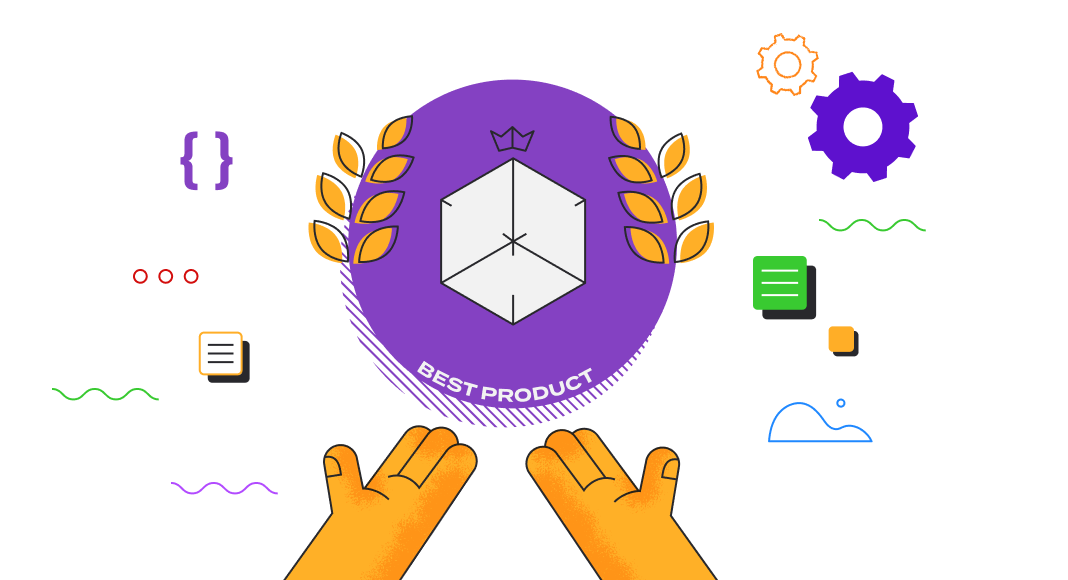SQL (Structured Query Language) is a universal language for interacting with relational database management systems (RDBMSs), and those interactions can vary in complexity depending on the capabilities of the SQL tool you are using. Most modern SQL tools, including free SQL database software, cover the needs of both seasoned database professionals and casual users, especially those that provide graphical user interfaces. However, database systems are not one-size-fits-all: each comes with its own features, advantages, and limitations.
That’s why we’ve put together this review of the most popular options, ranging from versatile free database software to specialized free SQL Server tools, so you can choose the best fit for your projects.
What is SQL software?
SQL software refers to the tools that allow developers and administrators to interact with relational database management systems (RDBMSs). These tools make it possible to design schemas, write and execute queries, manage users and permissions, and perform data analysis.
Depending on the use case, SQL software can range from lightweight, browser-based clients to advanced integrated development environments (IDEs) with debugging, schema comparison, and monitoring features. The best SQL software balances usability with the specific functionality required for your environment, whether that’s learning SQL basics or managing enterprise-scale workloads.
Overview of popular SQL database systems
Before we start reviewing actual SQL software, let’s briefly describe the database management systems that these tools deal with. Plenty of various DBMSs are in operation now, but the lion’s share of the market belongs to 4 major systems:
Microsoft SQL Server

SQL Server, developed and marketed by Microsoft, is a relational database management system, and a much favored option in corporate environments. If there is a high demand for handling numerous transactions and conducting comprehensive business analytics, SQL Server enters as the top choice. This RDBMS also offers advanced data security and in-memory performance, as well as integrated business intelligence tools.
Supported OS: Primarily Windows, with support for Linux and Docker containers (necessary for work on macOS).
Key features:
- Scalability through features like clustering, partitioning, and parallel query processing
- SQL Server Integration Services (SSIS) for data integration and transformation
- SQL Server Reporting Services (SSRS) for creating, managing, and deploying reports
- SQL Server Analysis Services (SSAS) for online analytical processing (OLAP) and data mining
- Robust security features including encryption, authentication, and access control
- High availability through features like AlwaysOn Availability Groups and failover clustering
- Full-text indexing and searching capabilities
Pros:
- Seamless integration with other Microsoft products and services
- Excellent performance when dealing with complex queries
- Both on-premise and cloud environments
Cons:
- Primary optimization for the Windows environment
- High licensing costs
Recommended tools for Microsoft SQL Server:
- dbForge Studio for SQL Server (Express edition)
- SQL Server Management Studio + dbForge SQL Tools
- DBeaver
- DbVisualizer
- HeidiSQL
MySQL and MariaDB

MySQL is an open-source relational database management system, currently owned by Oracle Corporation. MariaDB, a derivative of MySQL, was developed by the original MySQL creators to maintain full compatibility with MySQL. Globally, MySQL stands as one of the most popular database systems, a robust and versatile platform for a wide variety of applications, particularly within small and medium-sized business projects.
Supported OS: Cross-platform, including Windows, Linux, and macOS
Key features:
- High performance, especially in read-heavy operations
- Scalability through features like replication, sharding, and clustering
- Multiple storage engines
- Support for various replication configurations
- Support for triggers and stored procedures
- Advanced security with user authentication, access control, and encryption
Pros:
- Free, open-source platform (both MySQL and MariaDB)
- A large active community providing support
Cons:
- Lack of optimization for large-scale projects
Recommended tools for MySQL and MariaDB:
- dbForge Studio for MySQL (Express edition)
- MySQL Workbench
- phpMyAdmin
- Adminer
- SQLyog
Oracle

Oracle Database is a leading database management system, particularly valued for its enterprise-scale capabilities. It frequently becomes the default option for projects that require handling complex transactions and managing sizable databases within corporate settings. Additionally, effective use in cloud computing and data warehousing makes Oracle a preferred choice in the most demanding environments.
Supported OS: Cross-platform, including Windows, Linux, and Unix.
Key features:
- High availability and disaster recovery with Oracle Real Application Clusters (RAC) and Data Guard
- Support for partitioning
- Transparent Data Encryption (TDE), fine-grained access control, and audit vault
- Multitenant architecture with features like pluggable databases (PDBs)
- Various data compression techniques
- Advanced Analytics feature for in-database analytics and machine learning
- Spatial and graph database features
Pros:
- Enterprise-level functionality, reliability, and performance
- Advanced security with plenty of features to ensure the safety of data
Cons:
- Steep learning curve
- High price due to the licensing model
Recommended tools for Oracle:
- dbForge Studio for Oracle
- Oracle SQL Developer
- Toad for Oracle
- Valentina Studio
PostgreSQL

PostgreSQL is a widely recognized open-source, object-relational database system. Its growing popularity stems from its remarkable extensibility and full compliance with SQL standards. With support for advanced data types and a comprehensive suite of performance optimization features, PostgreSQL delivers exceptional speed, flexibility, and high performance.
Supported OS: Cross-platform, including Windows, Linux, and macOS
Key features:
- Support for a wide range of data types, including arrays and user-defined types
- Native support for JSONB data type
- MVCC (Multiversion Concurrency Control) for concurrent transactions
- Foreign Data Wrappers (FDW) for accessing data from external sources
- Full-text search
- Support for table partitioning
- Support for streaming and logical replication
- SSL support, role-based access control (RBAC), and row-level security
Pros:
- Free, open-source platform
- Active community
- High customization and flexibility
- Integration with other databases and systems
Cons:
- Difficult performance tuning, which requires time and experience
- Lack of proper optimization for enterprise-level projects
Recommended tools for PostgreSQL:
Free SQL tools for beginners and learning
The best way to build SQL skills is by using tools that are reliable, easy to set up, and widely supported. For beginners, some options stand out for their balance of simplicity and functionality. These include:
- MySQL and PostgreSQL: both open-source databases with extensive documentation.
- phpMyAdmin: a simple web-based client for MySQL that’s used in educational setups.
- Adminer: lightweight and easy to deploy for quick SQL practice.
- pgAdmin: the default PostgreSQL client, designed with usability in mind.
These tools help learners experiment with queries, practice database design, and build confidence before moving on to more advanced environments.
Working with multiple SQL databases
The database management systems mentioned previously represent the most popular options for the majority of projects. However, organizations may not rely solely on one system. Nowadays, it is a common practice to utilize multiple DBMSs for various purposes throughout the organization.
Multidatabase

This trend highlights the need for a universal solution (an application or a bundle of applications), compatible with all the required database systems, and covering the most widespread tasks related to database development, management, and administration.
Recommended tools for multidatabase environments:
- dbForge Edge (Express edition)
- HeidiSQL
- DBeaver
- DataGrip
Best free GUI tools for SQL databases
A wide range of graphical tools exist to simplify SQL development and administration. In this review, we focus on top free SQL database tools that combine usability with essential functionality. These free database software solutions are helpful to both professionals and learners. The most widely used options include:
- dbForge Studio (Express edition)
- SSMS + dbForge SQL Tools
- dbForge Edge (Express edition)
- DBeaver (Community edition)
- DbVisualizer
- HeidiSQL
- Oracle SQL Developer
- Valentina Studio Free
- MySQL Workbench
- phpMyAdmin
- Adminer
- pgAdmin
Best free SQL software for Windows
Windows remains the primary platform for many SQL management environments, especially in corporate settings. As a result, several tools stand out as the best free SQL software for Windows, combining robust features with accessibility at no cost.
Two of the most widely used are dbForge Studio (Express edition) and SQL Server Management Studio (SSMS). Both options give Windows users a reliable way to cover essential database tasks without licensing fees, making them popular choices for developers, DBAs, and learners alike. Let’s explore them.
dbForge Studio (Express edition)
dbForge Studio is Devart’s flagship product, a comprehensive integrated development environment (IDE) tailored for a variety of database management tasks across different database management systems. It comes in four versions: for SQL Server, MySQL/MariaDB, Oracle, and PostgreSQL/Amazon Redshift. The main goal of dbForge Studios is to minimize manual efforts and accelerate the completion of routine tasks by offering a suite of tools for database development and design, management, administration, and data analysis.
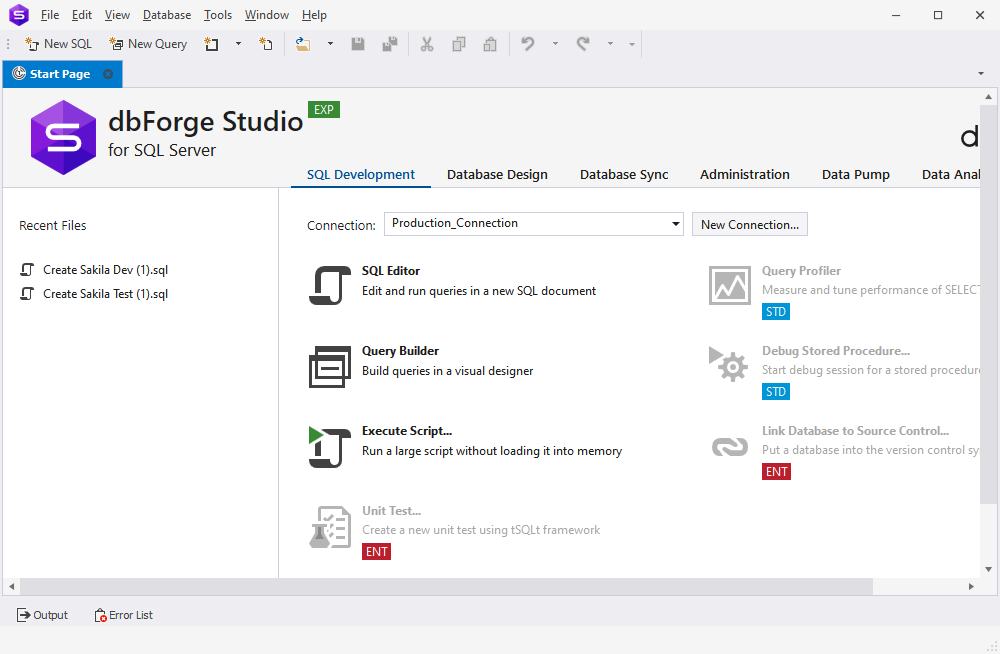
Each dbForge Studio comes in a free Express edition that covers basic functionality. For users requiring more advanced features, paid editions are available through either subscription-based or perpetual licensing options, with fully functional free trials.
Platform: Windows-native, yet can be launched on macOS and Linux via Wine or CrossOver
Key Features:
- Coding assistance with auto-completion, code formatting, syntax checking, debugging.
- Integrated AI assistant for intelligent database productivity.
- Query Builder for visual query construction without manual coding.
- Database Designer for visual database development through ER diagrams.
- Data import and export (support for 10+ data formats).
- Test data generation (200+ generators).
- Database monitoring and real-time troubleshooting.
- User management.
- Data analysis and reporting.
Pros:
- Database comparison and synchronization (involving both schemas and data)
- Automated generation of database documentation
- Data aggregation in pivot tables and visualization with graphs
- CLI-powered automation
- Detailed product documentation and other learning resources, including video tutorials
- Personalized support
Cons:
- Lack of native support for non-Windows OS (requires compatibility solutions)
- Focus on a single DBMS
- Lack of more advanced features in the free Express edition
Pricing:
- Free – Express edition (limited features)
- Paid – Subscription or perpetual license, from $9.95 per month, depending on the edition. Free trial: 30 days (fully functional)
SSMS + dbForge SQL Tools
SQL Server Management Studio (SSMS) is Microsoft’s stock IDE for SQL Server, designed to perform database-related tasks across SQL infrastructures, from SQL Server to Azure SQL Database. With its rich functionality and flexible configuration options, SSMS allows users to tailor the solution to their needs and develop, manage, and maintain SQL Server databases effectively.
A significant advantage of SSMS lies in its extensibility through specialized add-ins. In addition to its own collection of plugins, SSMS supports third-party add-ins, offering the opportunity to enhance the standard functionality. Notably, the dbForge SQL Tools package stands out as a comprehensive suite of 15 add-ins for SSMS, introducing a plethora of new options to the familiar interface, ranging from advanced code assistance to Source Control integration. You can install the entire package or some tools separately.
Together, SSMS and dbForge SQL Tools are often regarded as some of the most effective free SQL software for Windows, providing everything from query writing to schema comparison without additional licensing costs

Platform: Windows, requires virtual machines to run on other OS
Key features:
- IntelliSense-based code completion
- T-SQL code debugging
- Visual tools for database design and query building
- Database schema and table data comparison and synchronization
- Database monitoring and tuning
- Task scheduling and automation
- Reporting services management
Pros
- All-in-one tool for managing SQL Server databases
- Smart and intuitive graphical user interface (GUI)
- Support and regular updates from Microsoft
- Easy functional extensibility via plugins
Cons:
- Limited to Microsoft SQL environments
- Possible compatibility issues for older SSMS versions
- Requires virtual machines to run on macOS or Linux
Pricing:
- SSMS – Free
- dbForge SQL Tools – The package includes 5 free tools (notably, the Express edition of the powerful SQL Complete coding assistant), others are available for trial. Subscription-based license from $399.95 per year. Free trial: 30 days (fully functional)
dbForge Edge (Express edition)
dbForge Edge is a comprehensive multidatabase solution offering advanced functionality. It comprises four specialized dbForge Studios, enabling users to efficiently manage a wide range of database tasks across major database management systems such as SQL Server, MySQL/MariaDB, Oracle, and PostgreSQL.
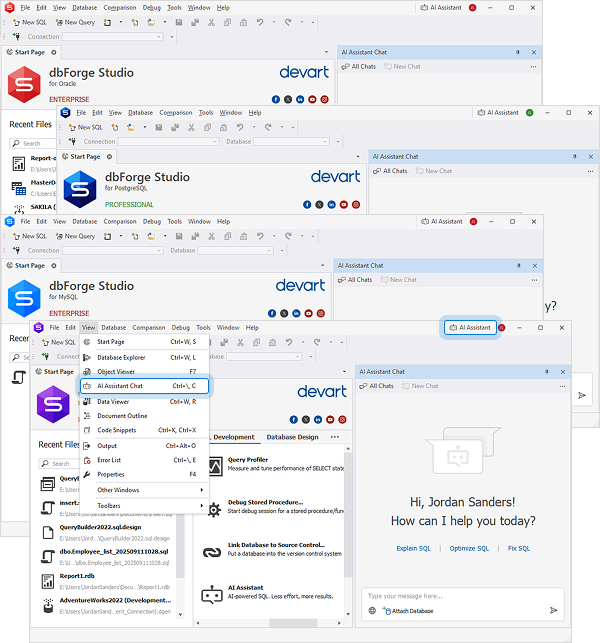
dbForge Edge serves as a universal toolset for professionals handling diverse database systems in their work, providing all necessary options within a single solution and eliminating the need for multiple tools and IDEs.
Platform: Windows-native, yet can be launched on macOS and Linux via Wine or CrossOver
Key features:
- SQL coding assistance with auto-completion, formatting, debugging, and refactoring capacities and integrated AI assistant.
- Customizable collection of code snippets
- Query building, analysis, and optimization
- Schema and data comparison and synchronization
- Easy generation of high-quality test data
- Data import and export to 10+ most popular data formats
- Data analysis and reporting
- Server monitoring
- User and privilege management
- CLI-powered automation
Pros:
- One solution for handling tasks across multiple database systems
- Smart user interface with robust customization options
- Direct data migration between databases in different DBMSs
- Regular updates with functionality enhancements
- Comprehensive documentation
- Professional support from the vendor
Cons:
- Limited features in the free Express edition
- Available options vary across the Studios
- No native support for macOS and Linux (requires Wine or CrossOver)
Pricing:
- Free – Express edition (basic functionality)
- Paid – Subscription-based license starts from $699.95 per year
Free trial: 30 days
DBeaver (Community edition)
DBeaver is one of the leading database management tools, favored for its extensive compatibility with over 80 different database systems, including all the major DBMSs. This wide-ranging support makes it an ideal choice for environments that operate with multiple databases.
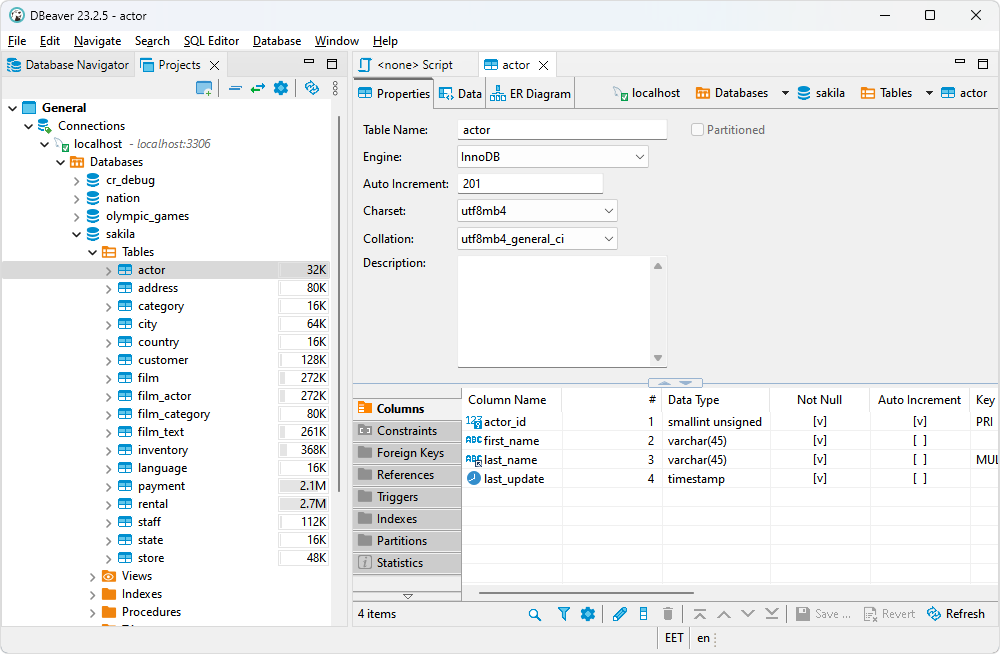
As an open-source application, DBeaver allows users to tailor itself to meet all their specific needs. Powerful features, coupled with a clean user interface allow professionals of all levels to conduct their work efficiently across all platforms used in their daily workflows.
Platform: Windows, Linux, macOS
Key features:
- SQL Editor with code auto-completion, script debugging, and snippets
- Visual construction of databases and tables
- Visual Query Builder to create complex queries without coding
- Data import and export to the most popular formats
- Server monitoring with a visual SQL EXPLAIN plan
- Multiple test data generators with data customization
- Backup and recovery
- Tracking of user sessions
Pros:
- Connection manager for multiple database connections
- Robust visualization capacities with diverse data viewing options
- Database comparison (schemas and table data)
- Numerous security-related features
Cons:
- Advanced functionality is provided in paid editions
- Personal support is provided to paid users only
- Limited schema comparison options
- Short free trial
Pricing:
- Free – Community edition
- Paid – Subscription-based license from $11 per month
Free trial: 14 days
DbVisualizer
DbVisualizer is a universal database tool for developers, DBAs, and analysts, designed to be user-friendly and suitable for varying levels of expertise in database management. Moreover, it is a multidatabase solution that supports a range of popular DBMSs and offers a convenient GUI, letting the users speed up their routine tasks.
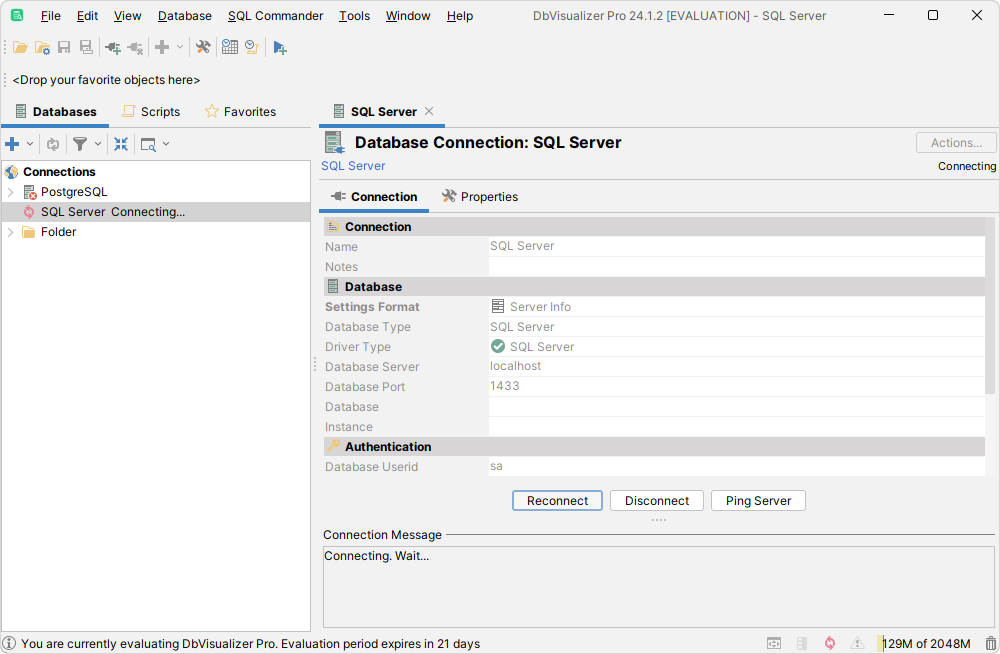
Platform: Windows, Linux, macOS
Key Features:
- Smart code auto-completion and syntax check
- Visual query construction and analysis (the EXPLAIN plan)
- Data visualization and direct data editing
- Data import and export
- User access configuration and control
Pros:
- Code formatting tools
- UI customization with various themes and options
- Advanced connection security
Cons:
- No database comparison and synchronization
- No database performance monitoring features
- Insufficient support and learning materials
Pricing:
- Free – Limited functionality
- Paid – $197 per the first year, license renewal $69.00 per year
HeidiSQL
HeidiSQL is an established multidatabase tool that efficiently copes with essential database tasks, including SQL coding, query construction, and the creation and editing of various database objects, along with some administrative jobs. While it may lack some of the advanced features found in more robust tools, HeidiSQL remains a popular choice among database specialists thanks to its open-source nature and ease of use.

Platform: Windows-native, requires Wine for operating on Linux
Key features:
- SQL code completion and formatting
- Library of SQL code snippets
- Visual construction of complex queries
- Database user management
- Data import and export
- Backup and recovery
Pros:
- Easy connection management with command-line support
- Secured connection with encryption
- Bulk table editing
- Text search across database tables and various databases
Cons:
- Limited functionality
- Lack of documentation and vendor support
Pricing: Free
Oracle SQL Developer
Oracle SQL Developer, created by Oracle Corporation, serves as the default graphical user interface (GUI) client for Oracle Database, both on-premises and cloud-based.
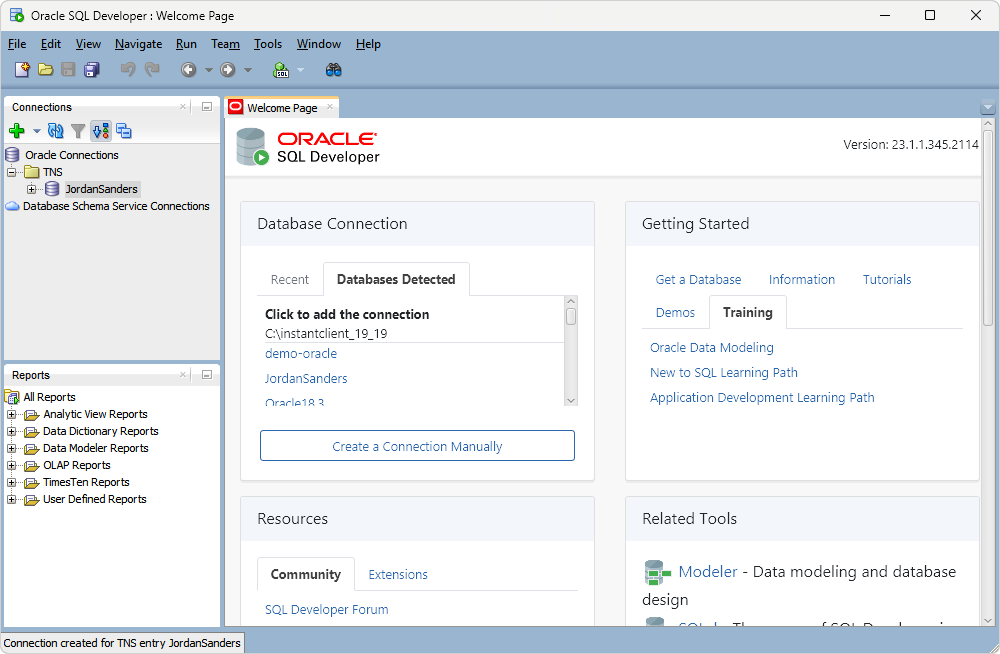
As an Oracle product, it handles a wide range of standard database development and management tasks and comes at no additional cost with any Oracle Database license, also ensuring regular updates and support provided by the company.
Platform: Windows, Linux, macOS
Key features:
- PL/SQL coding with context-aware auto-completion
- Visual query design and analysis
- Visual database design
- Data migration
- Database administration, including performance tuning, session monitoring, and user management
- Data reporting
- Version control integration
- Unit testing for PL/SQL entities
Pros:
- Reverse and forward engineering support
- In-built features for the migration of third-party databases to Oracle
- Multi-language interface
Cons:
- Lack of learning resources
- High resource consumption
Pricing: Free
Valentina Studio Free
Valentina Studio is a multidatabase GUI tool for easy management of MySQL, MariaDB, SQL Server, SQLite, PostgreSQL, and its own Valentina DB databases. An intuitive interface allows users to manage, model, and develop database schemas, perform complex SQL queries, and analyze data.
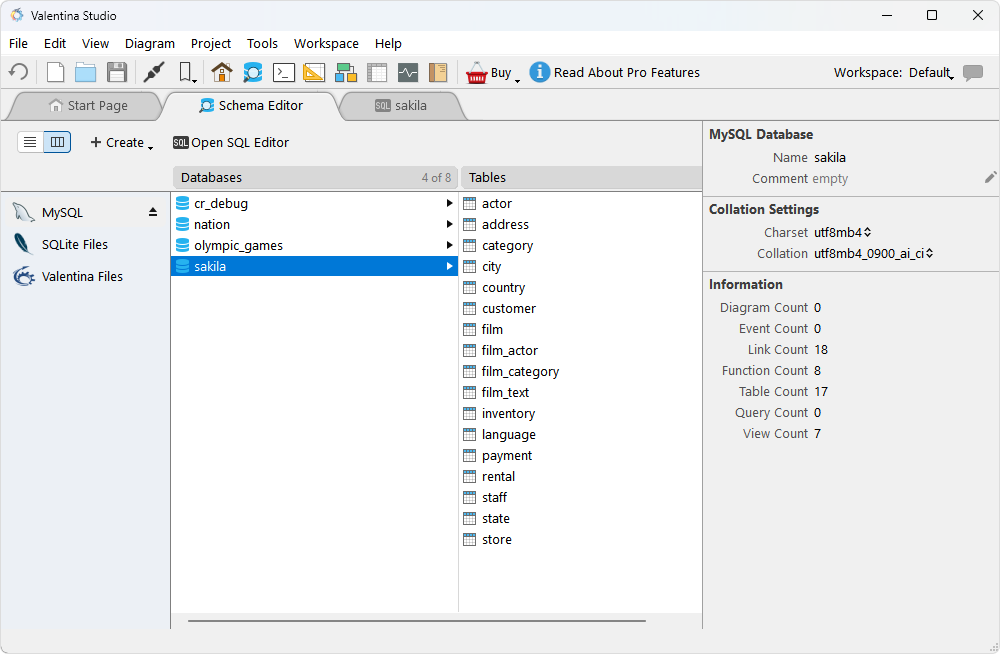
Valentina Studio stands out for its versatility and efficiency in handling database-related tasks, making it a valuable tool for professionals working with data.
Platform: Windows, Linux, macOS
Key features:
- Smart SQL editor with auto-completion
- Visual database modeling and query building
- Schema comparison and synchronization
- Database-specific direct data editing
- Database administration features
- Data reporting with visualization
Pros:
- Database-specific code snippets
- Handy keyboard shortcuts
- Convenient and intuitive user interface
- Quick data search
- Easy handling of multiple databases in different DBMSs
Cons:
- Lack of proper documentation
- Lack of technical support
Pricing:
- Free – Basic functionality
- Paid – From $99.99 (perpetual license)
MySQL Workbench
MySQL Workbench is the default IDE for MySQL and MariaDB, available for free. It is one of the most popular solutions for database development and management, with robust functionality and an intuitive graphical interface. Workbench is a great aid for users of all expertise levels, allowing them to speed up all routine operations, reduce the amount of manual work, and minimize errors caused by the human factor.
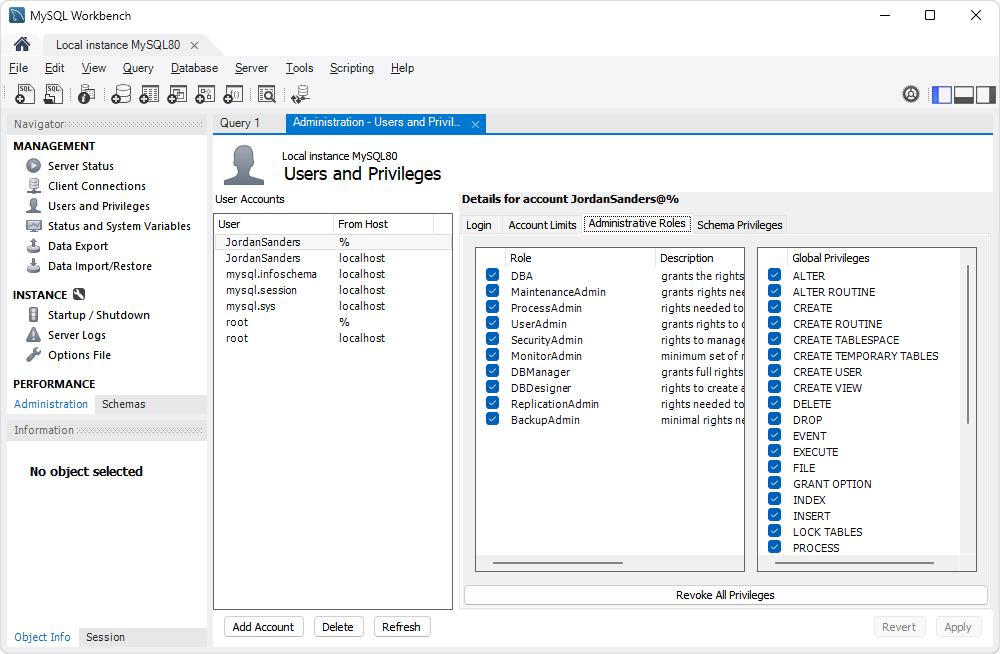
Platform: Windows, Linux, macOS
Key features:
- Powerful SQL editor (context-aware auto-completion, syntax check, code formatting)
- Visual database and table design and editing
- Query analysis with the EXPLAIN plan
- Object editor
- Data import and export (most popular data formats)
- Comprehensive database administration and monitoring tools
- Basic database documenting
Pros:
- Advanced data modeling
- SSH and SSL support
- Database connection management
- Large and active community
Cons:
- Lack of visual query building
- Lack of code debugging
- Restricted database schema and data comparison (is possible via Shell for MySQL utilities only)
Pricing: Free
phpMyAdmin
phpMyAdmin is a user-friendly web-based tool for managing MySQL databases. Its neat graphical interface that simplifies database management tasks and accessibility via a web browser makes this tool a popular choice. Offering the functionality necessary to perform a wide range of standard database tasks efficiently, phpMyAdmin allows working effectively regardless of location or device.
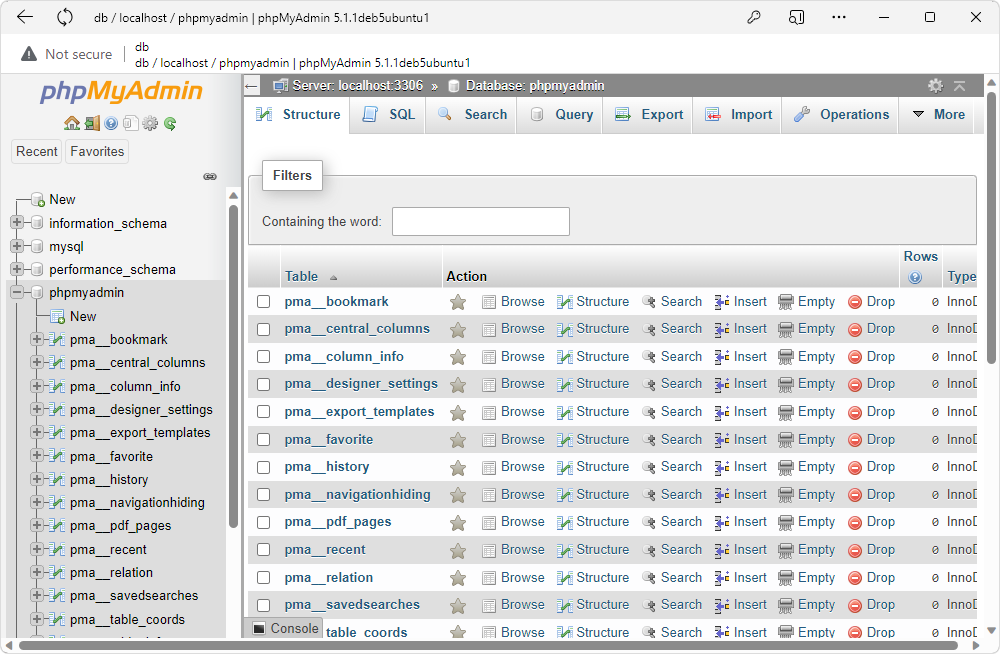
Platform: Web-based
Key features:
- SQL editor with code completion and syntax validation
- Creation, editing, and management of databases and their objects
- Visual database design and editing
- Database explorer
- Data editor with various viewing options
- Data export and import
- User and session management
Pros:
- Search across tables and various databases
- Precise user permission configuration
- Detailed documentation and other informational resources
- Active and supportive community
- Localization in 72 languages
Cons:
- Requires a web server and PHP installed and configured
- Brings additional load on the server
- Lacks some essential features like code debugging or database comparison
Pricing: Free
Adminer
Adminer is a web-based database management tool that often serves as an alternative to phpMyAdmin. Its popularity is based on its user-friendly interface, security features, and enhanced performance. This tool provides users with the capability to connect to multiple database servers, directly write and execute SQL queries on specific databases, manage databases efficiently, and carry out essential tasks with ease.
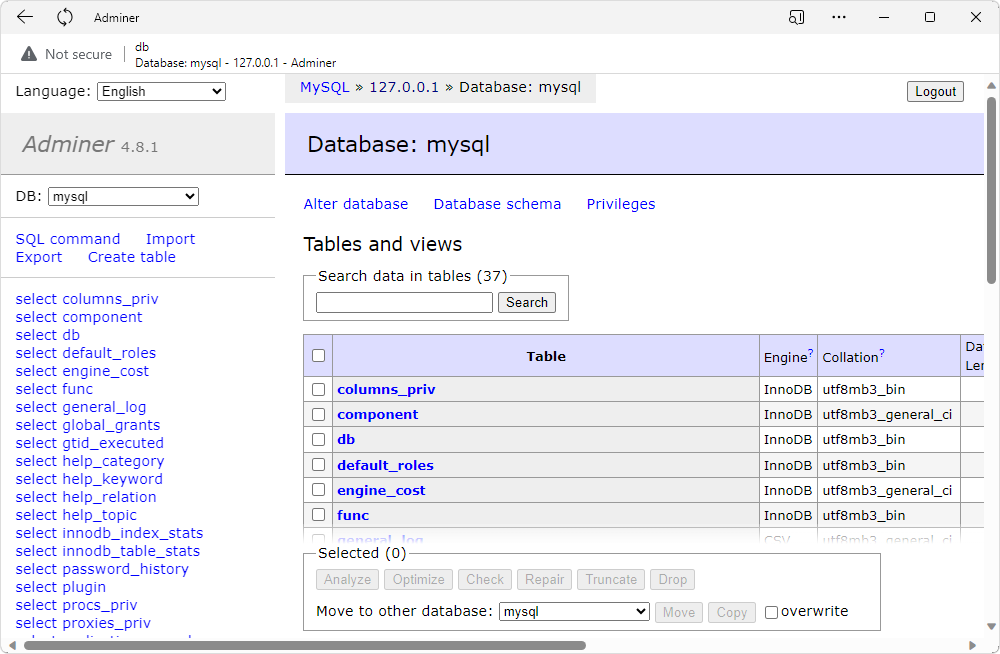
Platform: Web-based
Key features:
- Connection manager for multiple database connections
- Query writing and execution against any specific database
- Database creation and editing
- Database object creation and editing
- Search for data across tables and databases
- Data import and export
- User and privilege management
Pros:
- Single-page application with a neat GUI
- Database schema printing
- Extensibility through dedicated plugins
- Collection of ready-made themes and designs for UI customization
- Localization in 43 languages
Cons:
- Requires a web server and an installed and configured PHP
- The functionality is limited in comparison to other IDEs
Pricing: Free
pgAdmin
pgAdmin is the leading open-source tool for managing and administering databases on PostgreSQL. It is also the only application defined as the Postgres default client. pgAdmin offers a web-based interface that enables users to manage their databases from any location and comes equipped with a comprehensive suite of features for executing various database tasks, enhancing its accessibility and efficiency for users across the globe.
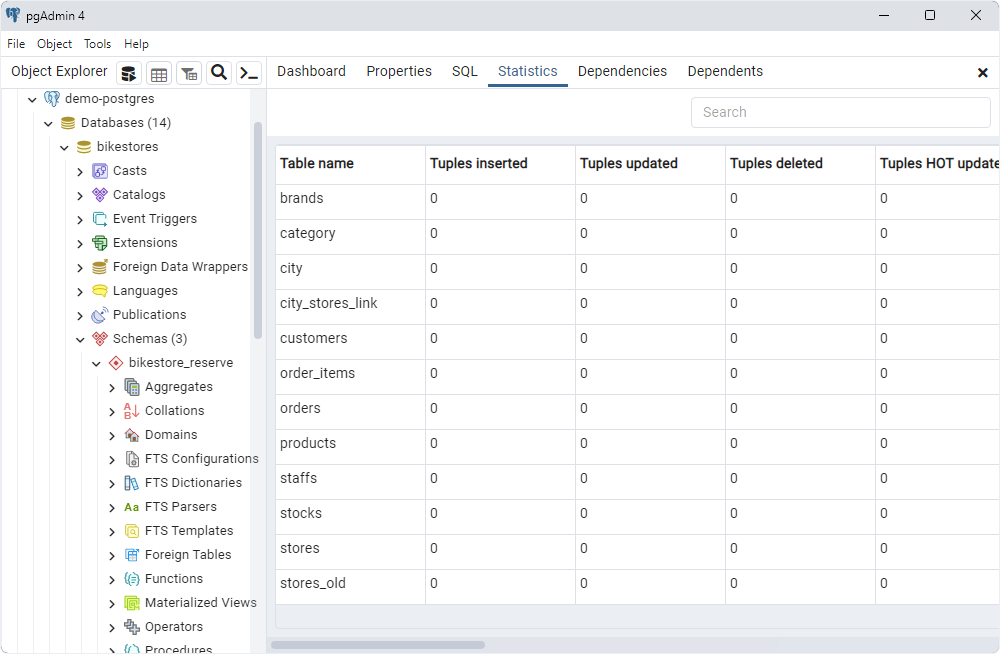
Platform: Web-based
Key features:
- SQL editor with smart code completion, syntax validation, and refactoring features
- Query analysis with the visual SQL execution plan
- Data editor
- Data search on a live database
- Effective navigation through objects
- Schema comparison and synchronization
- Data import and export (CSV, Text, Binary formats)
- Database administration capacities
Pros:
- SQL code debugging
- Extensive documentation
- Large professional community
Cons:
- No reporting functionality
- No UI customization options
Pricing: Free
These are the best-established GUI tools for doing various database tasks in different DBMSs.
Top free SQL database tools compared
Choosing the right tool often comes down to compatibility and feature set. The table below compares the most widely used free SQL database software, highlighting their supported DBMSs, platforms, and key strengths.
| Tool | Supported DBMSs | Platform | Key strengths |
|---|---|---|---|
| dbForge Studio (Express) | SQL Server, MySQL/MariaDB, Oracle, PostgreSQL | Windows (Linux and macOS via compatibility solutions like Wine or CrossOver) | Rich IDE features, schema/data comparison, visual query building |
| SSMS + dbForge SQL Tools | SQL Server, Azure SQL | Windows | Official Microsoft IDE, enhanced with free dbForge add-ins |
| dbForge Edge (Express) | SQL Server, MySQL/MariaDB, Oracle, PostgreSQL | Windows (Linux and macOS via compatibility solutions like Wine or CrossOver) | Unified solution for multiple DBMSs, strong automation and monitoring |
| DBeaver (Community) | 80+ databases | Windows, macOS, Linux | Multi-database support, open-source, strong visualization |
| DbVisualizer | Major DBMSs | Windows, macOS, Linux | User-friendly UI, data visualization, cross-platform support |
| HeidiSQL | MySQL/MariaDB, PostgreSQL, SQL Server | Windows (Wine for Linux) | Lightweight, easy to use, popular for basic tasks |
| Oracle SQL Developer | Oracle Database | Windows, macOS, Linux | Official Oracle tool, strong PL/SQL development support |
| Valentina Studio Free | MySQL/MariaDB, SQL Server, PostgreSQL, SQLite, Valentina DB | Windows, macOS, Linux | Schema comparison, query building, visual modeling |
| MySQL Workbench | MySQL/MariaDB | Windows, macOS, Linux | Official Oracle (MySQL) tool, strong data modeling and administration |
| phpMyAdmin | MySQL/MariaDB | Web-based | Lightweight, browser-based, ideal for quick management |
| Adminer | Multiple (via plugins) | Web-based | Simple, fast, single-file deployment |
| pgAdmin | PostgreSQL | Web-based | Official PostgreSQL client, full-featured, widely supported |
Choosing the right SQL software
The right choice depends on your goals and environment. Developers working in Microsoft ecosystems may find SSMS and dbForge Studio the most practical. Teams that need cross-platform flexibility often prefer DBeaver or DbVisualizer, while learners benefit from lightweight web tools like phpMyAdmin or Adminer.
When evaluating the best SQL software, focus on three factors:
- Compatibility: ensure the tool supports your primary DBMS.
- Functionality: check whether you need basic query execution or advanced features like schema comparison and monitoring.
- Scalability: consider whether the tool can handle larger, more complex projects as your needs grow.
No single solution fits everyone, but by weighing these factors, you can match the tool to your exact requirements.
Conclusion
In the current review, we have compiled information about various database management solutions, mainly focusing on those available free of charge. We have described their functionality and highlighted both the advantages and disadvantages of each. We hope that this review will help you choose the best solution for your work.
If you are still unsure which one is the best fit, you might as well start with the fully functional free trial of dbForge Edge that is provided for 30 days and offers you to test all of its powers under full workload.

